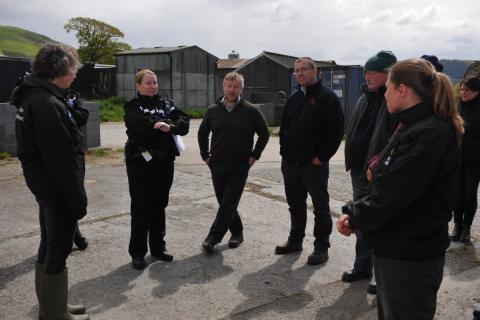Rural criminals are becoming more sophisticated in how they operate, using computers to steal from farmers in Wales.
Cyber crooks are taking advantage of relatively weak online security measures to defraud farmers.
During a recent farm security event at Trawscoed, a Farming Connect Innovation Site near Aberystwyth, farmers were urged to regularly update security measures to keep high-tech criminals at bay.
They were warned that, by doing nothing about securing the farm business from online criminals, they would eventually be caught out.
Hackers use automated software to crack passwords by scanning social media and other sites; a strong password will most certainly reduce risk.
Using a name that can be found in a dictionary should be avoided; a password should be a combination of letters or numbers that can’t be guessed by an automated process or a person. A Welsh password can be more challenging for criminals.
The biggest threat to a farm business comes from within the farm – when family members or staff click on unwanted or unexpected emails that immediately infect computers.
To minimise the risk of this happening, a dedicated computer solely for farm business is advisable.
Destroy or electronically shred unused hard disks, uninstall unused programmes and keep anti-virus software up to date.
For farms that run diversification businesses, such as a campsite, there is a security risk to the business if it uses the same wi-fi network offered to guests.
Advertising non-existent machinery in agricultural publications is another tactic scammers use; if an advert sounds too good to be true it is. At the very least, a fraudulent advert may lure a farmer to call a premium rate number. Phone providers can be asked to block premium rate numbers.
Temporary Inspector Matthew Howells, of Dyfed Powys Police, signposted farmers to the ‘Get Safe Online’ and ‘Action Fraud’ websites.
Outside the farm office, quad bikes, machinery, farm tools and red diesel are top of the list for rural thieves.
Farms and their outbuildings are vulnerable to burglaries due to their isolated locations, warned Arfon Griffiths, of Dyfed Alarms.
He demonstrated how simple it was to cut through a standard padlock.
“Small locks are not going to protect anything, don’t skimp on the security rating of a lock,’’ said Mr Griffiths.
Most locks have security ratings ranging from 1-15 – the higher the number, the more effective the security. Locks with number combinations are as effective as locks with keys. But, once the combination has been shared, change it, advised Mr Griffiths.
Never leave a key in a lock or in the ignition of a farm vehicle. “Protect the shed that houses your milk bulk tank to prevent someone from deliberately contaminating the milk,’’ Mr Griffiths recommended.
To avoid inconvenience for the tanker driver collecting the milk, store the key in a key safe, which can be linked to a CCTV camera.
Painting gates a distinguishing colour can be a deterrent and applying forensic marking material directly behind the hinge.
Trailer locks cost as little as £20 and a device that creates a security beam can be linked to a mobile phone which alerts the farmer when that beam has been broken.
Temporary Inspector Howells likened the layers of farm security to the circles of an onion. “Make it as hard as possible for criminals to get through the layers to where the item they are intending to steal is. That is a deterrent because a criminal knows that the longer it takes for them to get in, the more chance they have of getting caught.’’
Jamie McCoy, of Farming Connect, who facilitated the event, said the message from the day was that farmers should regularly evaluate their security measures.
“Make improvements where necessary, remain vigilant and report any suspicious activity to the local police,’’ she said.

